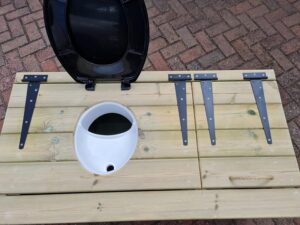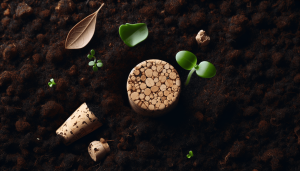Welcome to our guide on managing composting in a small garden! In this article, we’ll explore practical tips and techniques to efficiently compost even in limited space. We’ll cover everything from selecting the right compost bin, handling kitchen scraps, to maintaining the correct balance of greens and browns. Whether we’re seasoned gardeners or just starting out, these insights will help us transform waste into rich, organic soil that will nourish our plants and enhance our garden’s health. How Do I Manage Composting In A Small Garden?
Have you ever wondered how you can effectively compost in your small garden? Don’t worry, we’ve got you covered! Composting can seem intimidating, especially when you’re working with limited space. However, with a little know-how and some innovative strategies, it can become a rewarding and environmentally-friendly way to enrich your garden. Let’s dive into the nitty-gritty of composting in a small garden.

What is Composting?
Before we get into the details of managing compost in a small space, let’s briefly cover what composting actually is. Composting is the natural process of recycling organic matter into a rich soil amendment known as compost. This “black gold” does wonders for our garden soil, improving its structure, enriching it with nutrients, and boosting microbial activity.
Why Should We Compost?
There are numerous benefits to composting which go beyond just enhancing our small garden’s soil. Here’s why we should consider it:
- Reduces Waste: Composting helps us recycle kitchen scraps and garden waste, which otherwise would end up in landfills.
- Nutrient-Rich Soil: Compost adds essential nutrients to the soil, promoting healthier plant growth.
- Eco-Friendly: Composting reduces our carbon footprint by minimizing methane emissions from landfills.
- Cost-Effective: We save money on fertilizers and soil conditioners.
Understanding the Basics of Composting
Understanding the basics is crucial for effective composting, especially in smaller gardens.
Essential Components for Composting
Composting requires the right balance of three key components:
- Browns: These are carbon-rich materials like dead leaves, branches, and twigs.
- Greens: These are nitrogen-rich materials such as grass clippings, vegetable scraps, and coffee grounds.
- Water: Maintaining the right level of moisture is important to help break down the organic matter.
The Ideal Mix
A good compost pile is all about balance. Generally, we aim for roughly 3 parts browns to 1 part greens.
| Component | Types of Materials | Example |
|---|---|---|
| Browns | Dry leaves, cardboard, straw, wood chips | Fall leaves, shredded paper |
| Greens | Fruit scraps, vegetable trimmings, coffee grounds | Banana peels, vegetable peels, coffee filters |
Choosing the Right Composting Method for Small Spaces
When space is limited, we need to be strategic about the composting method we choose. Let’s explore some effective methods tailored for small gardens.
1. Compost Bins
Compact and Efficient: Compost bins are great for small spaces. They keep the compost contained, helping control odors and keeping pests at bay.
Types: There are various types of compost bins to choose from:
- Tumble Bins: These are easy to use and speed up the composting process through regular turning.
- Stationary Bins: These are simple and require less upfront cost. However, they need manual turning and mixing.
2. Worm Composting (Vermicomposting)
Nature’s Recyclers: Worms are incredible at breaking down organic matter into highly nutritious compost. Key Benefits: Worm composting is extremely efficient and can even be done indoors.
3. Bokashi Composting
Fermentation Process: Unlike traditional composting, Bokashi uses a fermenting method to break down food waste. Space-Saving: This method is excellent for small spaces as it can be done in a compact container.
Setting Up Your Composting System
Now that we know the possible methods, let’s discuss how to set up our composting system efficiently in a small garden.
Choosing a Location
Partial Shade: The best spot for our compost bin or pile is a well-drained area with some shade. Full sun can dry out the compost too quickly.
Accessible: Place the bin close to where we generate most of our kitchen waste for convenience.
Preparing the Base
Layering: Start by adding a layer of coarse materials like twigs or straw at the bottom. This ensures good airflow and drainage.

Maintaining Your Compost
Maintenance is key to successful composting. Regular attention ensures our compost matures quickly and without issues.
Turning the Compost
Aeration: Turn the compost regularly to aerate it and speed up the breakdown process. For stationary bins, use a pitchfork to mix the materials.
Monitoring Moisture
Goldilocks Rule: The compost should be moist, but not waterlogged. Think about the texture of a damp sponge.
Controlling Odor and Pests
Avoiding Smelly Compost: Bad odor typically results from excess moisture or too many greens. Adjust the ratio and turn the pile to fix this.
Keeping Pests Away: To keep pests at bay, avoid adding meat, dairy, or oily foods.
Harvesting and Using Compost
Timing is Everything
Ready to Use: Compost is ready to use when it looks dark, crumbly, and has an earthy smell. This usually takes a few months.
How to Use: Spread the compost on top of our garden soil, mix it into potting soil, or use it as mulch around plants.

Common Mistakes and Troubleshooting
We all make mistakes when trying something new. Here are some common composting issues and how to solve them.
Common Mistakes
- Too Wet: This can cause odor and slow decomposition. Fix it by adding more browns.
- Too Dry: Compost needs moisture to break down. Add water or greens to balance it out.
- Imbalance: Too much of one type of material can throw off the composting process. Maintain a proper mix of greens and browns.
Troubleshooting
| Issue | Cause | Solution |
|---|---|---|
| Bad Odor | Too wet, not enough air | Add browns, turn the pile |
| Dry and Slow | Lack of moisture | Add water or greens |
| Pests | Inappropriate materials | Stop adding meat/dairy/oily foods |
Advanced Tips for the Enthusiastic Gardener
If we’ve got the basics down and we’re ready to level up, here are some advanced composting tips.
Compost Accelerators
Boosting Decomposition: Commercial compost accelerators or alternative natural additives like comfrey or nettles can speed up the process.
Compost Tea
Liquid Gold: Make compost tea by steeping compost in water. The resulting liquid is a nutrient-rich fertilizer.
Benefits of Composting Beyond the Garden
Composting isn’t just beneficial for our garden; it has wider environmental and personal benefits.
Environmental Impact
Reducing Landfill Waste: By composting, we significantly reduce the amount of waste contributing to landfill.
Financial Savings
Cutting Costs: Using homemade compost reduces the need to purchase costly soil conditioners and fertilizers.
Community Benefits
Inspiring Others: Our composting efforts can inspire family, friends, and neighbors to start their own composting journey.
Conclusion
Managing composting in a small garden might seem daunting initially, but with the right strategies, it’s entirely achievable. By understanding the basics, choosing the best composting method for our space, maintaining the compost effectively, and using it wisely, we can enjoy a nutrient-rich garden while doing our part for the environment. Happy composting!



